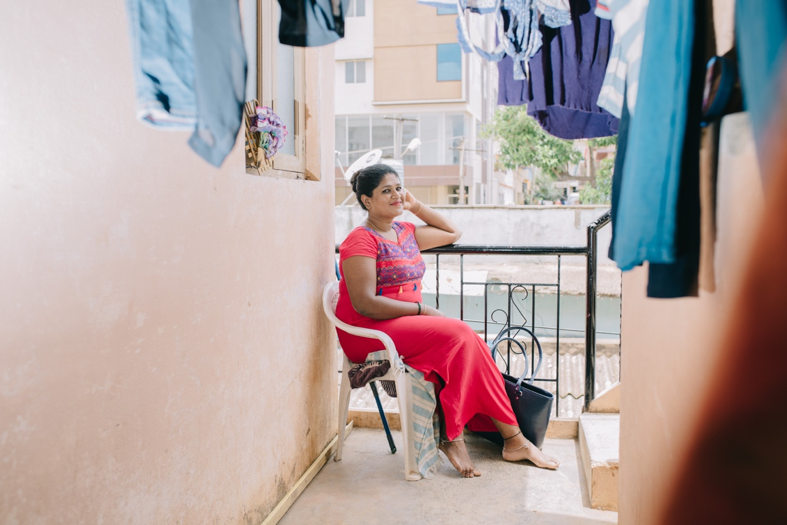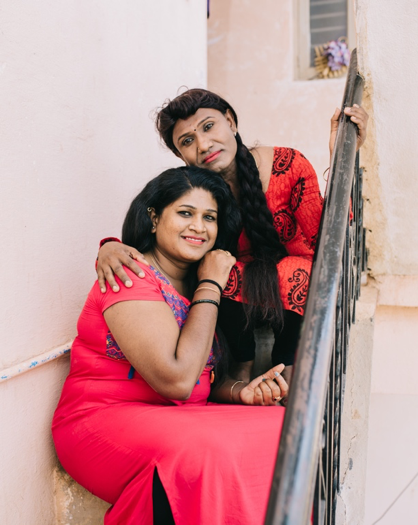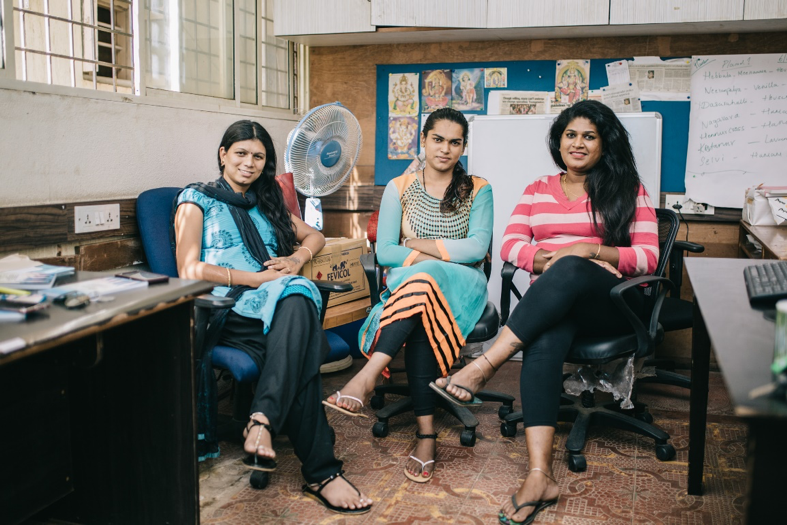This article was published more than 6 years ago.

As a child growing up in Karnataka, India, Sana Shree never quite fit in with the boys.
“I used to be really concentrated on my sister’s behavior. I loved to dress up like her.”
Had Sana been born with the anatomy of a girl, her affinity for her sister’s things would not have been an issue. But Sana came into the world with the anatomy of a boy and the feelings, urges, and identity of a girl—a tension that would lead to untold suffering in her younger years.
“At around age 10, my feminine character became more pronounced, and my mother started thinking something was wrong,” Sana recalled. “‘My son is behaving like a girl,’ she said, ‘What is wrong with him?’”
Now an openly trans woman in her mid-20s, Sana fights for the rights of people like her at Swatantra—the transgender rights organization she founded in 2016. A Fund grantee, Swatantra’s mission is to prevent others from experiencing the discrimination and abuse Sana endured as a child and young adult—experiences that were fresh in Sana’s mind during a recent interview with the Fund.
A tumultuous childhood
Initially, Sana’s mother thought her feminine behaviors were just a phase. But when Sana continued to express her femininity well into elementary school, she decided something was seriously wrong and brought Sana to see a priest.
“I was raised Roman Catholic, so my mom brought me to church to ‘help’ me,” Sana recalled. “She beat me with a Bible, saying, ‘A female ghost is trapped in my son’s body.’”
Unsurprisingly, the abusive religious ‘treatment’ did not work. Sana soon reverted to her old behaviors. When she was around 12, her parents sent her to a mental hospital, where she endured electroconvulsive therapy (a.k.a., ‘shock therapy’) and was given a slew of medications meant to ‘heal’ her.
The hospital stint left a lasting impact. Sana tried to conform to what her parents and society wanted, but she couldn’t live a lie. At the same time, she was confused about what was going on inside of her.
“I did not even know what my identity was, I didn’t understand,” she said. Then, at 15 she ran away from home, but her parents brought her back. For six months after, they refused to let her leave the house and kept her under 24-hour watch, accompanying her even to the bathroom.
For Sana, the invasion of privacy and denial of her freedom was the last straw. She moved out once and for all and found a transgender community group to support her.
“The transgender people gave me a sari, let me pierce my nose and ears and blow dry my hair. I was so happy, like a free bird flying high overhead.”
Unfortunately, Sana’s struggles were far from over.

A rocky new beginning
The trans group Sana joined brought an all-new feeling of belonging and solidarity, but there was one thing it could not provide: an income. Facing harassment and discrimination in school and the workplace, most members turned to begging or sex work to make a living.
“I first went to begging, but I used to get teased and faced physical violence from people and the police. So, I turned to sex work.”
Although Sana was able to earn more money in sex work, she was only “partially happy” with the profession.
“It’s a very difficult life. I was getting raped literally every day. And we used to get locked up. Police would bring petty cases against us, then make us clean the station, clean the toilets. There was sexual and physical harassment in the police station.”
Then Sana had an idea that changed her life.
“I thought I should go back to school so I can lead a good life,” she said. But having by now undergone sexual reassignment surgery, she faced one major obstacle. “I tried to apply to five colleges but was rejected because they said my certificates are in a male ID, and I looked female. They said ‘We can’t trust you, please get out. We don’t have space or permission to allow transgender people into the college.’”
But Sana was not about to take ‘no’ for an answer.
A trans rights trailblazer
Through her involvement with several trans rights groups in India, Sana was aware of the historic 2014 Supreme Court ruling that recognized transgender people as a ‘third gender.’
Armed with the ruling, she successfully advocated her way into St. Joseph College in 2015, becoming the first openly trans person to be admitted. She will graduate with her Masters in Journalism this year. Her victory opened the door for others: the college has admitted at least five more transgender students in recent years.
Sana’s next goal was to find a well-paying job within mainstream society. Once again, she succeeded and got a job at a web company.
While Sana was happy with her achievements, she did not yet feel fulfilled.
“I started wondering what the trans community needed. I started thinking that most trans rights organizations are working for HIV prevention and health. But when I surveyed trans community members as part of my graduate work, I found that they did not say health was their priority. First, they said, it’s family acceptance, then a job. So, I started Swatantra.”
Swatantra’s mission is to protect trans gender rights and dignity. She found common cause in a fellow grassroots group called Ondede, which works for the rights of women, children, sexual minorities, and other vulnerable segments of Indian society. The groups have since merged to become Ondede Swatantra.

Early impact and remaining challenges
Under Sana’s leadership, Swatantra has sought to address the range of issues affecting trans people in India, with a focus on Karnataka. They advocate for more transgender inclusive laws and policies at the local, state, and international level. They conduct research on issues affecting the transgender community. And they undertake community outreach campaigns and provide trans gender people with livelihoods support.
In just a couple years, Swatantra has made a significant impact on the trans rights movement. Their grassroots advocacy and outreach has played a key role in getting mainstream companies to hire trans people. By holding sensitivity trainings, they have helped over 10 trans people get jobs, including in the media, IT, and telecommunications sectors. They even helped one trans woman secure a position on Karnataka’s High Court—a major victory.
Many of the issues Swatantra takes up are inspired by Sana’s own experience. For example, they began advocating for safer sexual reassignment surgeries for trans people—something Sana did not have access to.
“I am the victim of an unsterilized sexual reassignment surgery. It caused stones in my kidneys.”
Together with her colleagues at Ondede Swatantra, Sana was able to push one public hospital to perform the surgeries according to safety standards, and to reduce the charge to an honorarium.
Despite these successes, much remains to be done to assist trans people in India. One of the biggest battles Ondede Swatantra is currently fighting is on the national transgender bill. They have already had success pushing for a protective policy in Karnataka State—a policy Sana helped draft—and are now joining their peers to secure something similar at the national level.
For Sana, the fight won’t end until trans people across India are treated as equals. “I really want my whole community to become mainstream. After all, we are all human beings. We have the same red blood flowing through our bodies.”